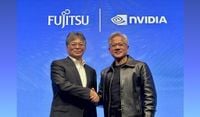On October 3, 2025, Fujitsu and Nvidia announced a sweeping expansion of their strategic partnership, setting their sights on transforming the landscape of artificial intelligence infrastructure in Japan and, ultimately, around the globe. The collaboration, revealed in Kawasaki, Japan, is more than a handshake between two tech giants—it's a bold leap toward building full-stack AI systems designed to accelerate automation, boost industrial competitiveness, and lay the technological foundation for Japan’s digital society by 2030.
At the heart of this alliance is the integration of Fujitsu’s Monaka CPUs with Nvidia’s industry-dominating GPUs, all linked together by the powerful NVLink Fusion. The result? An advanced AI agent platform that promises to support complex computational workloads across healthcare, manufacturing, robotics, and beyond. According to Fujitsu’s official press release, the goal is clear: deliver secure, high-performance, and customized AI solutions that can be tailored to the unique demands of each industry.
“Fujitsu’s strategic collaboration with Nvidia will accelerate AI-driven business transformation in enterprise and government sectors,” said Takahito Tokita, representative director and CEO of Fujitsu, at the press conference. “By combining the cutting-edge technologies of both companies, we will develop and provide full-stack AI infrastructure, starting with sectors such as manufacturing where Japan is a global leader. To further support the expanding needs of AI infrastructure, Fujitsu and Nvidia will expand this partnership in the areas of high-performance computing and quantum.”
Jensen Huang, founder and CEO of Nvidia, echoed this sentiment, declaring, “The AI industrial revolution has begun, and we must build the infrastructure to power it — in Japan and across the globe. Fujitsu is a true pioneer in computing and Japan’s trusted leader in supercomputing, quantum research, and enterprise systems. Together, Nvidia and Fujitsu are connecting and extending our ecosystems to forge a powerful partnership for the era of AI.”
The collaboration is not just about raw computing power. Central to the initiative is the development of secure, multi-tenant AI agents—digital workers capable of operating in environments where data privacy, security, and customization are paramount. This is particularly significant for industries like healthcare, where sensitive data and regulatory compliance are non-negotiable. With this platform, hospitals could deploy advanced AI diagnostics, while manufacturers might implement predictive maintenance and optimize production workflows—all without sacrificing control or security.
But what makes this partnership stand out in a crowded field of AI alliances? For starters, Nvidia’s GPUs now account for roughly 70% of global spending on new AI data centers, according to industry analysts cited by BBC. The company’s market capitalization has soared past $4.5 trillion, and its recent investments—including a planned $100 billion stake in OpenAI and ambitious new data center projects—underscore the surging demand for scalable, high-performance AI infrastructure worldwide.
Fujitsu, meanwhile, brings its own deep expertise in enterprise computing, supercomputing, and quantum research. By combining forces, the two companies aim to create a seamless ecosystem where CPUs and GPUs work in concert, supported by integrated software stacks that make deploying AI solutions as straightforward as possible. The plan is to start in Japan, but the ambitions are global, with the companies pledging to expand their platform and partner ecosystem to meet the evolving demands of industries everywhere.
The vision doesn’t stop at hardware. The companies are co-developing an AI agent platform that balances high speed and robust security, leveraging Fujitsu’s Kozuchi and AI workload orchestrator technology alongside Nvidia’s Dynamo and NeMo platforms. This allows for AI agents and models that don’t just perform tasks—they learn, evolve, and adapt to the specific needs of sectors such as healthcare and manufacturing. The resulting AI agents will be delivered as Nvidia NIM microservices, streamlining adoption for customers and enabling optimized inferences at scale.
“The combined AI agent platform and computing infrastructure will accelerate the AI industrial revolution with AI agents that continuously learn and improve,” the companies stated in their joint announcement. “This will enable cross-industry, self-evolving, full-stack AI infrastructure, overcoming the limitations of general purpose computing systems.”
The next-generation computing infrastructure is designed for zetascale performance—a level of computational power that, just a few years ago, would have sounded like science fiction. By integrating Fujitsu’s ARM-based technologies with Nvidia’s CUDA software ecosystem, the companies are laying the groundwork for a comprehensive HPC-AI (high-performance computing-artificial intelligence) environment. This will offer businesses a one-stop shop for AI transformation, from silicon to software.
Of course, the partnership isn’t just about technology for technology’s sake. Both Fujitsu and Nvidia are keenly aware of the broader societal implications. High costs and technical barriers have historically limited the benefits of generative AI to larger enterprises. By pooling their resources and expertise, the companies hope to break down these barriers, enabling smaller firms and new sectors to join the AI revolution. The initiative also aims to address pressing challenges like labor shortages through advanced robotics and “physical AI”—systems that perceive, judge, and act in the real world, such as automated robots in factories.
To drive adoption, the companies are building a robust partner ecosystem, launching joint programs, and developing transformative use cases that demonstrate the real-world value of their AI infrastructure. The first wave of these applications will roll out in Japan, with plans to expand as the platform matures. By 2030, Fujitsu envisions this AI infrastructure as an indispensable foundation for Japan’s digital society, supporting everything from smart factories to next-generation healthcare and beyond.
For now, the announcement has sent ripples through the tech industry, with many analysts predicting that the Fujitsu-Nvidia alliance could reshape the competitive landscape for AI infrastructure. With Nvidia’s GPUs powering the lion’s share of new data centers and Fujitsu’s leadership in enterprise and quantum computing, the partnership is well-positioned to meet the soaring demand for secure, scalable, and customizable AI solutions.
As the world stands on the cusp of an AI-driven industrial revolution, the collaboration between Fujitsu and Nvidia offers a glimpse into a future where intelligent agents, powerful computing, and human creativity work hand in hand to solve some of society’s most complex challenges. The coming years will reveal just how transformative this partnership can be—but for now, the groundwork is set, and the race to build the infrastructure of tomorrow is well underway.


